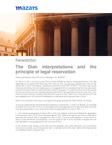
The Dian interpretations and the principle of legal reservation
On March 9, 2017, the Dian issued Oficio number 901902 by which it interpreted that the VAT rate applicable to the special AIU base was 19% and not 16%, as expressly established in the tax law (article 462-1 of the Tax Statute, modified by article 46 of law 1607 of 2012). This Oficio was issued internally and without a known addressee, so it suggests that it is a question that the Dian asks itself, and that it answers itself, to make its position clear to taxpayers. To justify its thesis, the Dian argued that the fact that the tax law expressly established that the rate applicable to the AIU was 16%, such reference was merely enunciative and referred to a general rate, reason why, if the general VAT rate was updated, such 16% should immediately be understood as the general rate in force.
Due to the relevance of the issue, it is important to quote textually the Dian's thesis, as follows:
"It is to be noted that the aforementioned subsection of Article 462-1 of the Tax Statute, as amended by Article 46 of Law 1607 of 2012, incorporated as the rate applicable to the special taxable base AIU (sic), the general rate in force at the time which corresponded to the rate of 16%, (...).
(...) the mentioned paragraph of article 462-1 of the Tax Statute, at the time reflected the application of the general rate in force which corresponded to 16%, without this giving rise now to understand that when the general rate is changed from 16% to 19%, it should not be applied in all the norms in which it was mentioned. Consequently, once the general rate in force has been changed, the rule that indicated it must be adjusted to the new rate of 19%.
In the content of the articles of the laws (sic) the legislator may make reference in an enunciative manner, for example, say "to the general rate", or directly "to the 16% rate", without this implying that it is a different rate or a special rate.
Therefore, it should not be considered that the 16% rate mentioned in some rules is in force, when in fact it corresponds to the general rate that today (sic) according to Law 1819 of 2016 is 19%".
Since Law 1819 of 2016 did not establish an organic repeal of the rules that regulate the sales tax, but only a modification to the general VAT rate, any special VAT rate that subsists in the legal system must be respected. The Dian could have, out of loyalty to the taxpayer, filed a claim of unconstitutionality against such provision seeking a declaration of conditional exequibility of the same, under the understanding that in such provision the 16% should really be understood as 19%. But no, it considered it easier and more practical to do so through the issuance of a general Oficio, which, of course, obliges the tax officers of the Dian to base their investigations on it.
This position of the Dian is inadmissible since it directly violates the constitutional principle of reserve of law in tax matters, as well as the superior principles of legality and certainty of the taxes by modifying -in its favor and through interpretation- the rate of a tax that is expressly and unequivocally established in the law.
In accordance with the principle of "nullum tributum sine lege", and in accordance with the provisions of articles 150 N.12 and 338 of the Political Constitution, in times of peace, the Congress of the Republic is the only one empowered to modify the tax rates, which the Dian is not aware of through its interpretations.
This Oficio, for having a general scope for all taxpayers, and in spite of not being legally established as a Concept, is a clear example of an administrative act on which the action of nullity for unconstitutionality established in article 135 of the Administrative and Contentious Administrative Procedure Code (Cpaca) may be exercised.


